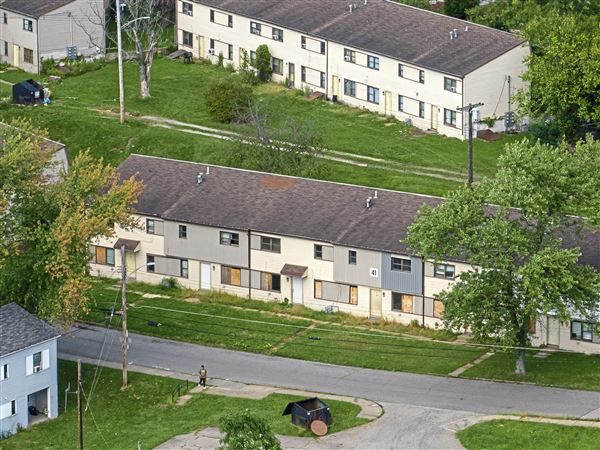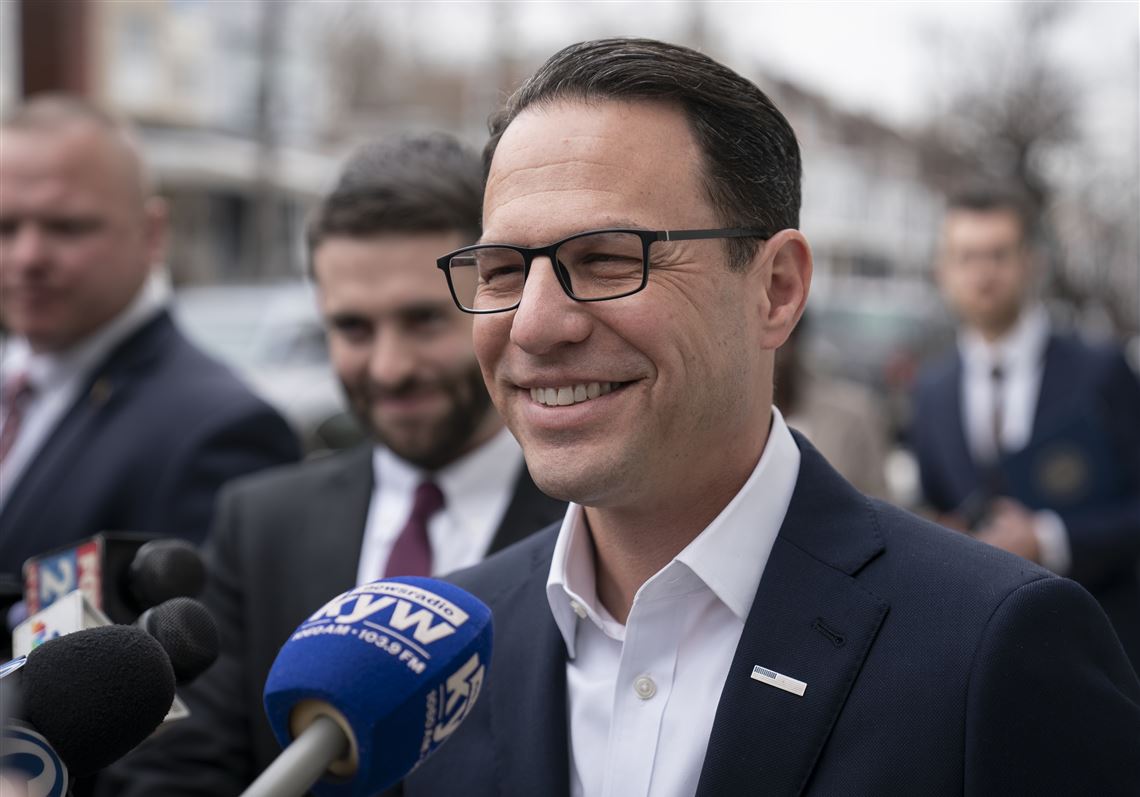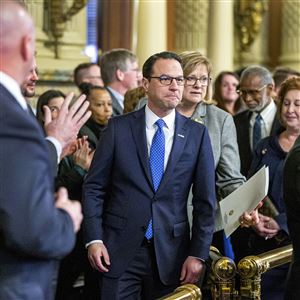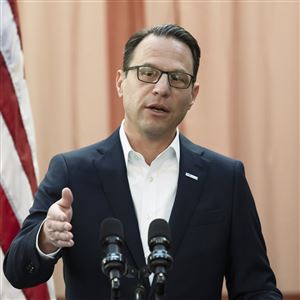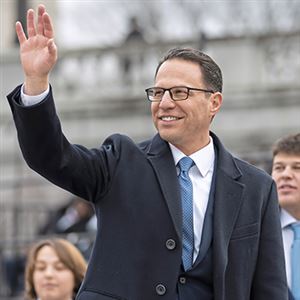HARRISBURG — When Gov. Josh Shapiro faces about 250 lawmakers in the Capitol on Tuesday to deliver his first state budget address, his task will be new and challenging, with issues such as education and the economy at the forefront. But the setting will be quite familiar to him.
That’s because Mr. Shapiro was a Democratic lawmaker himself for seven years, serving as a representative from Montgomery County. That, said state Rep. Robert Freeman, D-Northampton, is “one of the many attributes Josh has.”
“I think Gov. Shapiro is going to give us a dynamic budget proposal,” said Mr. Freeman, the longest-tenured member of the House, with 36 years of service.
Mr. Shapiro is expected to speak before a joint session of the House and Senate late Tuesday morning, about seven weeks to the hour after he was sworn in to succeed two-term Gov. Tom Wolf.
On that day, with his wife and children seated close by, Mr. Shapiro told Pennsylvanians, “Your problems have become my priorities.” Since then, lawmakers have prepared for how budget season in Harrisburg will play out under a new governor.
“My sense is that there has been a strong willingness to work with the governor,” said state Sen. Jay Costa, D-Forest Hills, the top Democrat in the chamber. “He has expressed that and I think my colleagues on the other side of the aisle have expressed that as well.”
The Legislature has changed markedly since the last annual budget process. While Republicans still control the Senate, Democrats have taken a one-seat majority in the House, their first in 12 years.
State Rep. Bryan Cutler, R-Lancaster, said things have changed since Mr. Shapiro left the chamber in 2012 to become a Montgomery County commissioner, and later state attorney general.
“We are in a much better situation now than when we were in the House together,” said Mr. Cutler, the House Republican leader. “I think that is in large part due to our good financial management over the last dozen or so years, and I think that has put us in a position where we can make good decisions for the Commonwealth going forward.”
Veteran lawmakers said it was likely Mr. Shapiro will emphasize education, economic development, infrastructure and public safety. Most details will reveal themselves only after Mr. Shapiro begins to speak Tuesday. His budget address is only the beginning of a protracted, multistage interaction between his administration and lawmakers that will create the final 2023-24 budget.
Soon after his address, House and Senate committees will hold hearings to scrutinize proposed expenditures department by department and sometimes line by line. Later, negotiations typically conducted behind closed doors will produce budget bills that must be approved by lawmakers and the governor.
And politics will remain in the background: The cross-party appeal of Mr. Shapiro’s 2022 candidacy was heralded as a blueprint for Democrats, and some of his early moves in office seemed tailor made to reach Republicans.
For example, Mr. Shapiro named former state Sen. Pat Browne, of Lehigh County, who last year was in the thick of budget negotiations as Republican chairman of the Senate Appropriations Committee, as secretary of revenue, pending confirmation by the Senate.
Here’s what to watch for in the governor’s first budget address, and the negotiations that will follow:
Pennsylvania’s fat wallet?
When the new governor takes the stage, Pennsylvania will have about $5 billion in its Rainy Day Fund, compared to less than $3 billion a year earlier. That’s enough to cover 42.6 days of General Fund expenditures, according to the state Treasury Department, close to the median for such funds across all 50 states.
The increase is due in large part to the vast sums of federal pandemic relief money doled out to states in recent years and higher-than-anticipated revenue from taxes and other sources.
Mr. Costa said that separate from the Rainy Day Fund, surging revenue helped the state bring a surplus into the current fiscal year of more than $5 billion. And revenue about eight months into the current fiscal year is more than $600 million ahead of expectations, Mr. Costa said.
“While that sounds great, we have a lot of things we would like to do that there is no longer federal money for,” Mr. Costa said, referring to the end of pandemic-era assistance.
Still, as the governor and lawmakers evaluate spending priorities, there are ominous signs in other financial data.
State Sen. Scott Martin, R-Lancaster, the new chairman of the Senate Appropriations Committee, said perceptions of the state’s financial situation may be more rosy than reality.
“We are already seeing downturns in some of our projections,” including in personal income tax collections and plummeting real estate-related tax collections, Mr. Martin said. And projections also point to budget deficits in years to come.
“Hopefully, there [are] new ideas, new ways that we can potentially find common ground,” Mr. Martin said. “We were really due for that.”
A newly divided Legislature
The newly split status of the state Legislature became formal last Tuesday with the swearing-in of House Speaker Joanna McClinton, D-Philadelphia, following the brief tenure of State Rep. Mark Rozzi, D-Berks. Mr. Rozzi had been a compromise choice in early January, when the two parties were locked in a power struggle.
Now Mr. Shapiro enters his first budget process with one chamber controlled by his party, whereas Mr. Wolf always faced a Legislature fully controlled by the GOP.
Mr. Freeman said that will make a huge difference to Democrats because it will strengthen the prospects of all their policy proposals. And Mr. Costa said it “changed the whole dynamic in Harrisburg” for budget and policy discussions. It will, he said, force Republicans to come to the table and meet with Democrats if they want to get things done.
“No longer do we have to worry that Republicans will advance something in the Senate and send it to the House and get rubber-stamped, or vice-versa,” Mr. Costa said. “This conversation forces compromise.”
Mr. Cutler, the Republican leader, cast it as far less significant.
“Our approach to budgeting is not going to change, regardless of majority or minority status,” he said. “We have been responsible with the money, that is what has allowed the surplus to build.”
Education as a perennial focus
The $43 billion budget enacted in July for the 2022-23 fiscal year included more than $16 billion for education, an increase of more than 11%.
Mr. Shapiro is widely expected to make education a core focus in his 2023-24 budget. And lawmakers said a Commonwealth Court decision last month that found Pennsylvania’s school funding system is unconstitutional will change the backdrop for the annual negotiations over education funding.
The decision is expected to be appealed, and Mr. Martin, who was chairman of the Senate Education Committee last session, said lawmakers “are all waiting for that final opinion to be written.”
Nonetheless, Mr. Martin said, “There [are] always better ways that we can do things to make sure that every child in this Commonwealth is in the right setting that meets their individualized needs.” The budget address, he said, will give an indication of where Mr. Shapiro wants to increase education funding.
The Associated Press reported Friday that Mr. Shapiro plans to offer a tax credit incentive for the training of teachers, as well as other professions.
Concerns persist that the state faces a teacher shortage. The number of teacher certifications in Pennsylvania has been in steep decline, going from about 15,000 new in-state certifications in 2010 to about 5,000 for the 2020-21 year, according to state data.
One fairly new program lawmakers believe Mr. Shapiro will maintain is Level Up, which divides a separate stream of funding between 100 school districts deemed most in need. In 2022-23, money distributed through Level Up included $2.2 million for the McKeesport Area School District, $1.4 million for Woodland Hills and $1 million for Sto-Rox.
Mr. Cutler stressed that factors other than funding influence education outcomes, including economics, food and health. During the pandemic, he said, schools have “really become a center for a lot of other services other than just education itself,” and he’ll be interested to see what level of support Mr. Shapiro seeks for those services.
Public safety and workforce development
The Associated Press reported that Mr. Shapiro will call for tax credits to train teachers, police officers and nurses.
State Rep. Melissa Shusterman, D-Chester, said such moves indicate the governor will continue on the path he started down in the first days of his administration, when he signed an executive order to encourage more people without college degrees to seek state government jobs. Days later, he announced a new Pennsylvania Office of Transformation and Opportunity, an Economic Development Strategy Group and the appointment of a “chief transformation and opportunity officer.”
“He has an honest interest in forwarding the economy,” Ms. Shusterman said. “If that is the first thing [he does] out of the gate, I have high hopes we will be able to keep our workforce.”
And she pointed to Mr. Shapiro’s history — he was attorney general for about five years and chairman of the Pennsylvania Commission on Crime and Delinquency for seven — as evidence public safety will be a prime focus during his administration.
"He definitely has a track record of making sure citizens are protected in this Commonwealth,” Ms. Shusterman said.
Ford Turner: fturner@post-gazette.com
First Published: March 5, 2023, 10:30 a.m.
Updated: March 6, 2023, 1:26 p.m.



